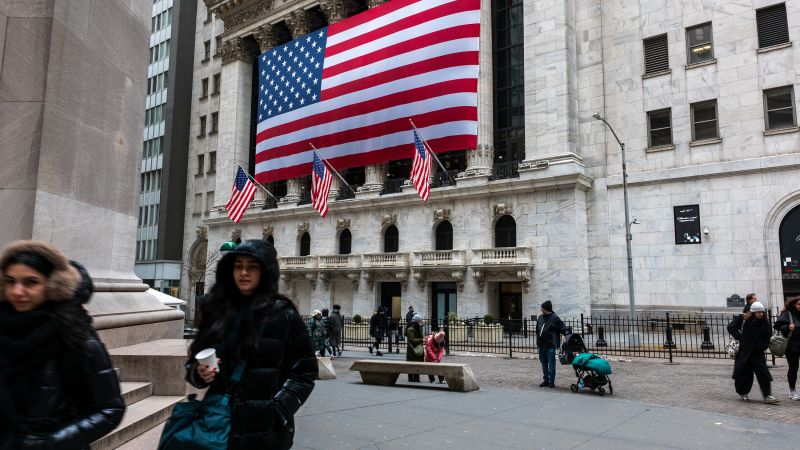US stock markets experienced a significant downturn on Friday, primarily driven by a concerning economic report indicating that American consumers are increasingly anxious about rising prices and the potential impact of President Trump’s tariffs on inflation. This decline in consumer confidence is raising alarms among investors, who fear it could lead to reduced spending and a slowdown in the economy.
Market Reactions: A Sharp Decline
The Dow Jones Industrial Average plummeted by 748 points, translating to a 1.7% drop. The S&P 500 mirrored this decline, also falling by 1.7%, while the Nasdaq took an even bigger hit, decreasing by 2.2%. This marked the second consecutive day of losses for the Dow, which has now seen a staggering decline of around 1,200 points over Thursday and Friday.
Consumer Sentiment Plummets
According to the latest findings from the University of Michigan, U.S. consumer sentiment has dipped for the second month in a row. The final reading for February revealed a troubling 10% decrease from January—double the earlier estimates. This downturn in confidence is largely attributed to fears surrounding rising prices, exacerbated by the ongoing tariff situation.
- 62% of U.S. adults express concerns that President Trump is not adequately addressing inflation issues.
- The Michigan survey indicated that consumers are increasingly worried about higher inflation rates in the near future.
Impact on Spending Habits
This weakening consumer sentiment raises concerns about a possible decline in spending habits, which are crucial as consumer expenditures account for over two-thirds of the country’s economic activity. While there are currently no signs of an impending recession, recent economic indicators reveal a slowdown. Job growth has tapered off over the past year, as businesses await clarity on the administration’s economic direction, particularly concerning tariffs that could severely impact profitability.
Housing Market and Retail Sales Trends
The housing market is also showing signs of strain. A report from the National Association of Realtors highlighted that existing home sales dropped by 4.9% in January compared to December, with prices reaching record highs, intensifying the affordability crisis for many Americans. Additionally, retail sales have seen a decline, with Walmart announcing on Thursday that it anticipates slower sales and profit growth this year—a stark departure from expectations that its competitive pricing would sustain its impressive growth streak.
- Walmart attributes its cautious outlook to consumer fears regarding rising prices and tariffs.
- The Michigan survey also noted a significant jump in inflation expectations, now at 4.3%, marking the highest level since November 2023.
Other Factors Influencing the Market
Another factor contributing to the market’s decline is UnitedHealth, a major player in the Dow, which saw its shares drop by 7% following reports that the U.S. Department of Justice is investigating its Medicaid billing practices. The company has firmly denied these allegations.
Despite this recent downturn, it’s important to note that stock prices remain close to their all-time highs, with the S&P 500 reaching a record just a day prior before retracting slightly.
For those keeping an eye on economic trends, the current landscape highlights the fragility of consumer confidence and the potential ripple effects on spending and investment. As we look ahead, it’s crucial to monitor how these factors will shape the economic outlook in the coming months.











